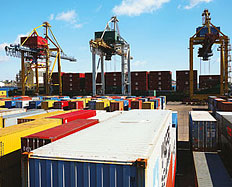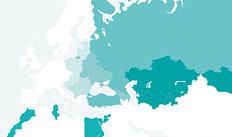COUNTRY ASSESSMENTS
Mongolia
HIGHLIGHTS OF THE PAST YEAR
- The mining boom in Mongolia continues. Economic growth accelerated from 6.4 per cent in 2010 to 17.5 per cent in 2011 and foreign direct investment (FDI), predominantly mining-related, reached 44 per cent of gross domestic product (GDP) in 2011, up from 26 per cent in the previous year.
- The government has further strengthened the fiscal framework. The Integrated Budget Law (IBL) will improve the reporting of government contingent liabilities and strengthen public investment planning.
- A new foreign investment law imposes new restrictions on foreign investment in mining, banking and other strategic industries. Significant foreign investments in these industries will now be subject to government or parliamentary approval.
KEY PRIORITIES FOR 2013
- The fiscal stability law (FSL) needs to be adhered to. The FSL passed in 2010 is the cornerstone of Mongolia’s fiscal framework for managing commodity revenues. It comes into force in 2013 and needs to be adhered to fully to ensure credibility of the overall framework.
- The system of cash transfers to the population needs to become fiscally sustainable. The unconditional monthly cash payment to each individual out of the Human Development Fund (HDF) imposes a high fiscal burden and is difficult to accommodate within the existing macroeconomic framework.
- Sustained financial development calls for further strengthening of the legal framework for financial markets. Improvements are needed, in particular, in the areas of deposit insurance, collateralised lending and securities trading.
MACROECONOMIC PERFORMANCE
The mining boom in Mongolia continues. Real GDP growth accelerated from 6.4 per cent in 2010 to 17.5 per cent in 2011 and remained strong in the first half of 2012 (13.2 per cent year-on-year). Growth has been supported by sustained high prices of copper and other commodities and record levels of FDI, which reached over 50 per cent of GDP in 2011. Expansionary fiscal policy also played a role: despite high growth, the general government recorded a deficit in excess of 3 per cent of GDP, largely due to increases in social transfers and public sector wages. This trend continued in the first half of 2012 in the run-up to the parliamentary elections held in June 2012. As a result, a larger fiscal deficit may be recorded in 2012 even as high commodity prices continue to boost government revenues.
In this context, stricter fiscal discipline would help Mongolia to better manage risks and avoid overheating. Against the backdrop of procyclical fiscal policy, inflation accelerated sharply, from 4 per cent year-on-year at end-May 2011 to 16 per cent at end-April 2012. The 2010 FSL, which introduces various measures aimed at improving fiscal discipline, will come into full force in 2013-14. Full adherence to the conditions of the FSL would require fiscal consolidation efforts as the law caps the structural fiscal deficit at 2 per cent of GDP (the structural fiscal deficit is calculated based on revenues estimated using historical average commodity prices).
The banking sector also experienced a boom. The mining boom led to a rapid credit growth (at the rates of 50 to 75 per cent year-on-year and even faster in the consumer segment). Consequently the non-performing loans ratio declined rapidly, to below 5 per cent, excluding the two banks in receivership, although the true quality of new assets is yet to be tested. Higher commodity revenues enabled the central bank to build up reserves of around US$ 2.5 billion (around four months of imports). The Bank of Mongolia also extended its swap line with China to US$ 1.6 billion equivalent. The economic boom also led to a sharp drop in the headline poverty rate, from 39 per cent in 2010 to 30 per cent in 2011, according to official estimates.
The economic outlook remains strong. Output growth is expected to reach 11.5 per cent in 2012, and perhaps accelerate further as new mining developments come on stream. The Oyu Tolgoi mine, one of the largest copper and gold deposits in the world, is on track to start operations in 2013 under the management of Ivanhoe Mines and Rio Tinto. Various options for development of Tavan Tolgoi, a multi-billion coal mining project, are currently being considered. At the same time, a downturn in global commodity prices may substantially weaken investment and economic activity given Mongolia’s high, and growing, dependence on mining.
MAJOR STRUCTURAL REFORM DEVELOPMENTS
The fiscal framework has been further strengthened with an Integrated Budget Law (IBL) and a revised Procurement Law. The IBL was passed in December 2011 to complement the existing FSL. The law further improves reporting of government contingent liabilities, strengthens public investment planning, and lays the foundation for fiscal decentralisation whereby more responsibilities may over time be devolved to the local governments. A move towards an inflation targeting framework by the central bank is currently being considered.
In January 2012 the parliament also passed a Social Welfare Law, which provides for a means-tested poverty benefit. The benefit is expected to reach around one-fifth of households and include an additional child allowance. Over time, it may partially or fully replace unconditional cash transfers disbursed out of the Human Development Fund (HDF). At the same time, in the first half of 2012 the monthly payments out of HDF (MNT 21,000 per citizen, or US$ 17) continued and were complemented with larger disbursements to the elderly and the disabled (with the first tranche of MNT 330,000, [US$ 250]).
The government further announced distribution of a portion of shares of the state-owned coal company, Erdenes Tavan Tolgoi (ETT), to the population. Under the scheme, each member of public is entitled to a certain number of shares of ETT. Overall, up to 20 per cent of ETT shares have been earmarked for this scheme, while additional minority stakes may be sold later via an initial public offering (IPO) in the local and international markets. Prior to the June 2012 elections the government made an offer to members of the public to exchange their ETT ownership entitlement for a single cash payment in 2013 set at MNT 1 million (approximately US$ 775). The majority of the population opted for a cash payment and the authorities are expected to clarify further modalities of this scheme. In particular, some shares in ETT may be sold to local companies prior to the IPO in order to raise financing for cash transfers.
The recently established Development Bank of Mongolia (DBM) broadened its funding base. DBM, a state-owned development agency inaugurated in the middle of last year, managed to place US$ 600 million (around 8 per cent of GDP) in government-guaranteed five‑year bonds at a 5.75 per cent yield. This yield is relatively favourable and suggests there is sustained investor interest in Mongolia. The use of proceeds is likely to include a combination of infrastructure and social housing projects, in line with the mandate of DBM.
In May 2012 Mongolia passed a law on foreign investment. The new law requires government approval for all investments by state-owned foreign entities. It also requires parliamentary approval of foreign ownership in excess of 49 per cent in companies operating in industries designated as “strategic”, namely, mining, finance, media and telecommunications. Large transactions involving minority foreign stakes in these sectors will be subject to government approval (within a 45-day period). The law aims to strike a delicate balance between the interests of the Mongolian people and the need to attract foreign expertise in key sectors, including mining. The parliamentary discussions of the law could have been in part influenced by the change of ownership of a major coal mining license in April 2012 when Ivanhoe Mines sold its majority stake in South Gobi Resources to China Aluminium Corporation (Chalco), majority owned by the Chinese state. The deal aimed to raise additional funds for development of Oyu Tolgoi, the core asset of Ivanhoe Mines and Mongolia’s largest mining development to date.
A number of legislative act governing the financial sector are being considered. The blanket deposit guarantee is set to expire in November 2012 and is expected to be extended and gradually replaced with a comprehensive deposit insurance scheme. A new securities law is a precondition for the planned dual listing of ETT shares.
Mongolia has adopted a law on gender equality. The law, adopted in February 2011, explicitly prohibits gender discrimination and introduces a 20 per cent quota for female candidates nominated by parties to stand in parliamentary elections. This provision was applied for the first time in the context of the June 2012 general elections.







